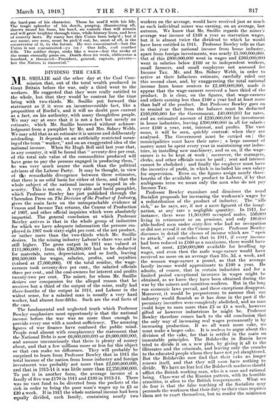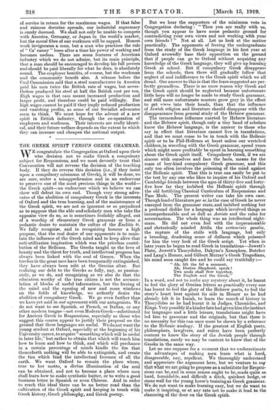DIVIDING THE CAKE.
it4 B. SMILLIE said the other day at the Coal Com- 13J, mission that, out of the total wealth produced in Great Britain before the war, only a third went to the workers. He suggested that they were really entitled to the whole, but that they would be content for the time being with two-thirds. Mr. Smillie put forward this statement as if it were an incontrovertible fact, like a proposition of Euclid's, and it will no doubt pass current as a fact, on his authority, with many thoughtless people. We may say at once that it is not a fact but merely an estimate, which Mr. Smillie borrowed without acknow- ledgment from a pamphlet by Mr. and Mrs. Sidney Webb. We may add that as an estimate it is untrue and deliberately misleading. It depends on an artificially restricted mean- ingof the term "worker," and on an exaggerated idea of the national income. When Sir Hugh Bell said last year that, in any country, it will be found that " seventy-five per cent. of the total sale value of the commodities produced will have gone to pay the persons engaged in producing them," he was very much nearer the mark than the political advisers of the Labour Party. It may be thought, in view of the remarkable divergence between these estimates, that there is no solid basis for either of them, and that the whole subject of the national income is wrapped in ob- scurity. This is not so. A very able and lucid pamphlet, which Professor Bowley has just published through the Clarendon Press on The Division of the Product of Industry, gives the main facts on the unimpeachable evidence of Census and Income Tax returns, the Census of Production • of 1907, and other official inquiries which were absolutely impartial. The general conclusion at which Professor Rowley arrives is that in the whole group of industries for which we have adequate information the persons em- ployed in 1907 took sixty-eight per cent. of the net product, or rather mom than the two-thirds which Mr. Smillie desires. In the mining industry Labour's sham was and is still higher. The gross output in 1911 was valued at £111,000,000; from this £30,500,000 had to be deducted for materials, rates, depreciation, and so forth, leaving 180,500,000 for wages, salaries, profits, and royalties (valued at £7,000,000). Of the total residue, the wage- earners took seventy-five per cent., the salaried officials three per cent., and the coal-owners for interest and profits twenty-two per cent. The miner, for whom Mr. Smillie desires our compassion for the alleged reason that he receives but a third of the output of the mine, really had tierce-fourths of the output in 1911, and Labour in the widest sense, for a salaried man is usually a very bard worker, had almost four-fifths. Such are the real facts of the case.
The fundamental and neglected truth which Professor Rowley emphasizes most opportunely is that the national income before the war was no more than enough to provide every one with a modest sufficiency. The amazing figures of war finance have confused the public mind. People read almost with complacency the statement that the National Debt is now £6,000,000,000 or £8,000,000,000, and assmne unconsciously that there is plenty of money about, and that a few millions more or less for this object or that can make no difference. They will probably be surprised to learn from Professor Bowley that in 1911 the total income of the nation from home industry and foreign investment was probably not more than £2,090,000,000, and that in 1913-14 it was little more than £2,250,000,000. To put it in another form, the average income of a family of five was £170 in 1911 and £180 in 1913-14. There was no vast fund to. be diverted from the pockets of the rich in order to bring the poor man's wages up to 15 or £10 a week. If in 1911 the whole national income had been equally divided, each family, containing nearly two
workers on the average, would have received just as much as each individual miner was earning, on an average, last autumn. We know that Mr. Smillie regards the miner's
average war income of £169 a year as starvation wages, but it is almost twice the dividend to which he would
have been entitled in 1911. Professor Bowley tells us that in that year the national income from home industry, apart from foreign investments, was nearly £1,900,000,000.
Out of this £800,000,000 went in wages and £260,000,000 went in salaries below £160 or to independent workers, small farmers, and small employers not assessed for Income Tax. Mr. and Mrs. Sidney Webb, in order to arrive at their fallacious estimate, carefully ruled out this second class, and, by exaggerating the total national income from home sources to £2,400,000,000, made it appear that the wage-earners received a bare third of the product. It is clear, on the figures, that wage-earners and others earning less than £160 a year had at least more than half of the product. But Professor Bowley goes on to remind us that from the balance must be deducted £180,000,000 for the Government, £40,000,000 for rates, and an estimated amount of £230,000,000 for investment in home industries, leaving £390,000,000 in all for salaries over 1160 a year, rent, interest, and profits. The vast sums, it will be seen, quickly contract when they arc analysed. The Government must be carried on ; the municipalities must have their rates ; a large amount of money must be spent every year in maintaining our indus- tries, in installing new machinery, and so on, if the wage- earner is to be kept at work ; moreover, the managers, clerks, and other officials must be paid ; rent and interest cannot be abolished ; and finally the employer must have the incentive of profit, in which is included his own salary for supervision. Even so, the figures assign nearly three- fourths of the available net product to Labour, if by that ambiguous term we mean only the men who do not pay Income Tax.
Professor Bewley examines and dismisses the usual Socialist proposals for increasing the workmen's wages by a redistribution of the product of industry. The "idle rich," as he says, are, if not a mere figment of the imagi- nation, at any rate a negligible quantity. In 1911, for instance, there were 11,303,000 occupied males, 550,000 living in retirement or on pensions, and only 180,00J able-bodied men under sixty-five who had no occupation or did not reveal it on the Census paper. Professor Bewley discusses in detail the classes of income which are " open to attack," and concludes that in 1911, if every income had been reduced to £160 as a maximum, there would have been, at most, £250,000,000 available for levelling up wages, and even then the male wage-earner would have received no more on an average than 35s. 3d. a week, and the woman wage-earner a pound, so that the average family income would approxiinate to £160 a year. Ile admits, of course, that in certain industries and for a limited period exceptional increases in wages might be obtained, as we know they have been obtained during the war by the miners and munition-workers. But in the long run economic laws prevail, and these exceptions disappear. Moreover, it would be preposterous to assume that out industry would flourish as it has done in the past if the pecuniary incentive were completely abolished, and no nian could hope to earn more than £3 or £4 a week, however gifted or however industrious he might be. Professor Bowley therefore comes back to the old conclusion that the only way of increasing real wages permanently is by increasing production. If we all want more cake, we must make a larger cake. It is useless to argue about the division of the cake, for that is settled in the main on immutable principles. The Bolsheviks in Russia have tried to divide it on a new plan, by giving it all to the illiterates and the criminals, and leaving only the crumbs to the educated people whom they have not yet slaughtered. But the Bolsheviks now find that their cake no longer renews itself, and that they will soon have nothing to divide. We have no fear lent the Bolshevik madness should afflict the British working man, who is a sane and rational being. Class-war of the Russian pattern, with its horrible atrocities, is alien to the British temperament. What we do fear is that the false teaching of the Socialists may persuade the workmen that their duty to their class requires them not to exert themselves, but to render the minimum of service in return for the maximum wages. If that false and ruinous doctrine spreads, our industrial supremacy is surely doomed. We shall not only be unable to compete with America, Germany, or Japan in the world's market, but the moral fibre of our workmen will be sapped. Honest work invigorates a man, but a man who practises the rule of " Ca' canny " loses after a time his power of working and becomes useless. There are some features of American industry which we do not 'admire, but its main principle, that a man should be encouraged to develop his full powers and should be paid liberally for what he does, is absolutely sound. The employer benefits, of course, but the workman and the community benefit also. A witness before the Coal Commission said that a steel manufacturer in America paid his men twice the British rate of wages, but never- theless produced his steel at half the British cost per ton. High wages in that case meant increased production and larger profit, and therefore could be paid willingly. But high wages cannot be paid if they imply reduced production and vanishing profits, as some of our Socialist advocates seem to think. We must hope for the advent of a new spirit in British industry, through the co-operation of employers and workmen. Their interests are really identi- cal, and their future welfare depends on the extent to which they can increase and cheapen the national output.







































 Previous page
Previous page